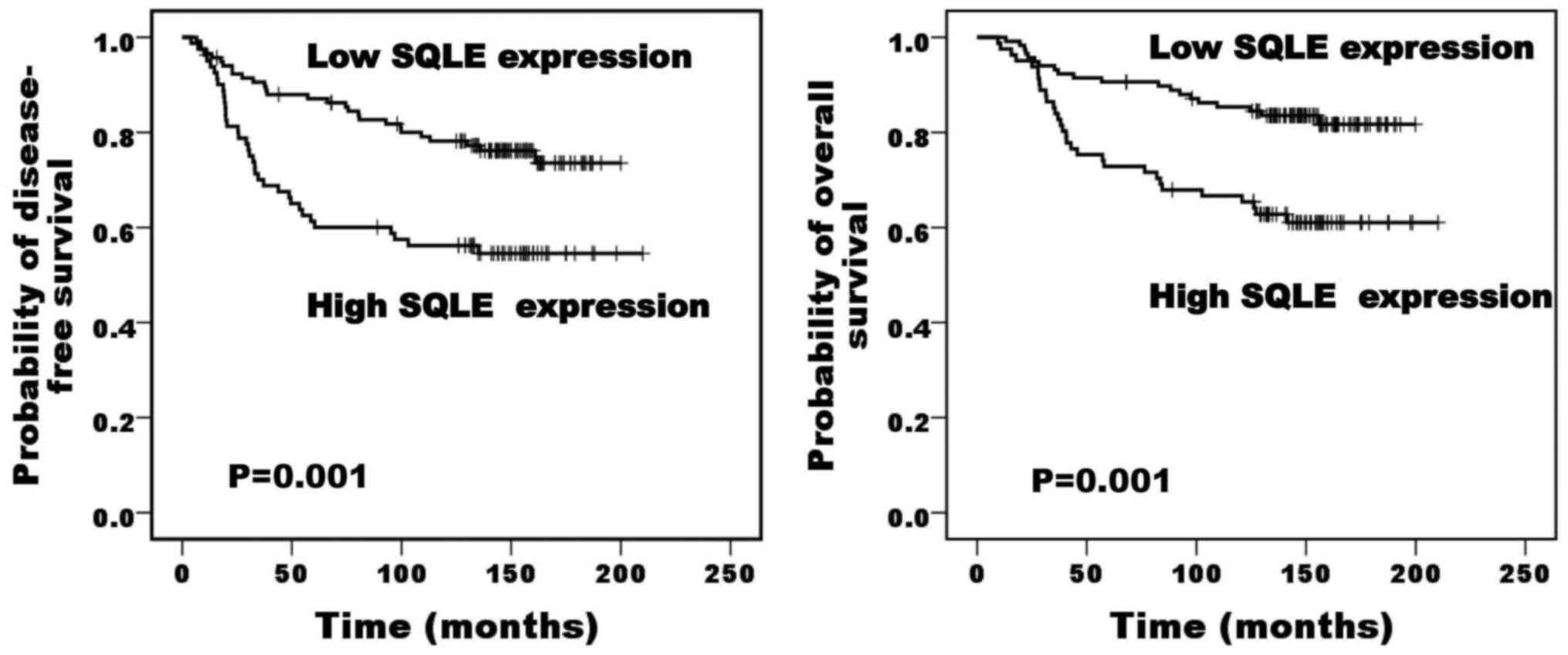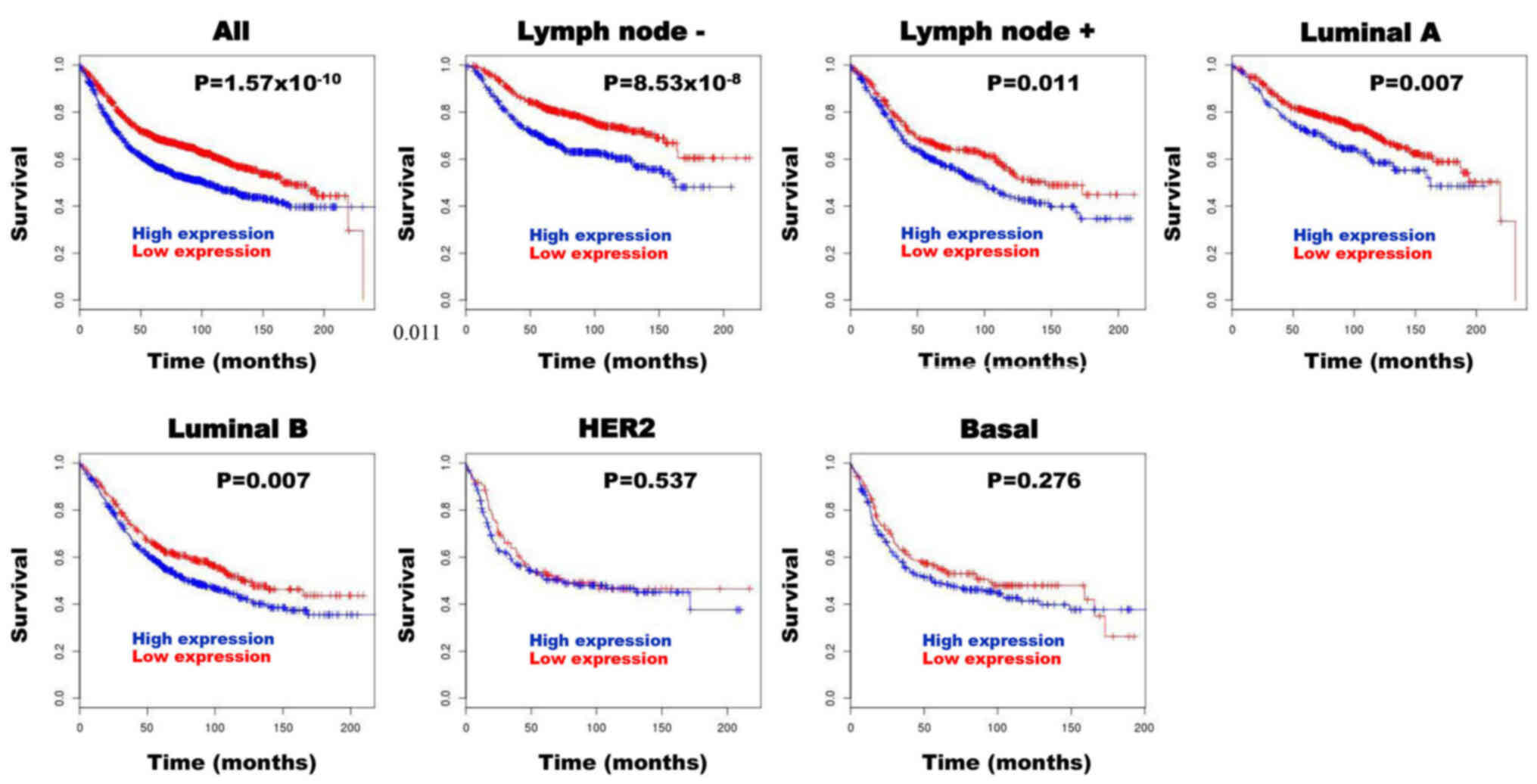|
1
|
Park EH, Min SY, Kim Z, Yoon CS, Jung KW,
Nam SJ, Oh SJ, Lee S, Park BW, Lim W, et al Korean Breast Cancer
Society, : Basic facts of breast cancer in Korea in 2014: The
10-year overall survival progress. J Breast Cancer. 20:1–11. 2017.
View Article : Google Scholar : PubMed/NCBI
|
|
2
|
Akram M, Iqbal M, Daniyal M and Khan AU:
Awareness and current knowledge of breast cancer. Biol Res.
50:332017. View Article : Google Scholar : PubMed/NCBI
|
|
3
|
Cirmena G, Franceschelli P, Isnaldi E,
Ferrando L, De Mariano M, Ballestrero A and Zoppoli G: Squalene
epoxidase as a promising metabolic target in cancer treatment.
Cancer Lett. 425:13–20. 2018. View Article : Google Scholar : PubMed/NCBI
|
|
4
|
Silvente-Poirot S and Poirot M:
Cholesterol metabolism and cancer: The good, the bad and the ugly.
Curr Opin Pharmacol. 12:673–676. 2012. View Article : Google Scholar : PubMed/NCBI
|
|
5
|
Hu J, Locasale JW, Bielas JH, O'Sullivan
J, Sheahan K, Cantley LC, Vander Heiden MG and Vitkup D:
Heterogeneity of tumor-induced gene expression changes in the human
metabolic network. Nat Biotechnol. 31:522–529. 2013. View Article : Google Scholar : PubMed/NCBI
|
|
6
|
Silvente-Poirot S and Poirot M: Cancer.
Cholesterol and cancer, in the balance. Science. 343:1445–1446.
2014. View Article : Google Scholar : PubMed/NCBI
|
|
7
|
Silvente-Poirot S and Poirot M:
Cholesterol epoxide hydrolase and cancer. Curr Opin Pharmacol.
12:696–703. 2012. View Article : Google Scholar : PubMed/NCBI
|
|
8
|
Nagai M, Sakakibara J, Wakui K, Fukushima
Y, Igarashi S, Tsuji S, Arakawa M and Ono T; Nagai M1, ; Sakakibara
J, Wakui K, Fukushima Y, Igarashi S, Tsuji S, Arakawa M and Ono T:
Localization of the squalene epoxidase gene (SQLE) to human
chromosome region 8q24.1. Genomics. 44:141–143. 1997. View Article : Google Scholar : PubMed/NCBI
|
|
9
|
Stopsack KH, Gerke TA, Sinnott JA, Penney
KL, Tyekucheva S, Sesso HD, Andersson SO, Andrén O, Cerhan JR,
Giovannucci EL, et al: Cholesterol metabolism and prostate cancer
lethality. Cancer Res. 76:4785–4790. 2016. View Article : Google Scholar : PubMed/NCBI
|
|
10
|
Stopsack KH, Gerke TA, Andrén O, Andersson
SO, Giovannucci EL, Mucci LA and Rider JR: Cholesterol uptake and
regulation in high-grade and lethal prostate cancers.
Carcinogenesis. 38:806–811. 2017. View Article : Google Scholar : PubMed/NCBI
|
|
11
|
Liu D, Wong CC, Fu L, Chen H, Zhao L, Li
C, Zhou Y, Zhang Y, Xu W, Yang Y, et al: Squalene epoxidase drives
NAFLD-induced hepatocellular carcinoma and is a pharmaceutical
target. Sci Transl Med. 10:4372018. View Article : Google Scholar
|
|
12
|
Souchek JJ, Baine MJ, Lin C, Rachagani S,
Gupta S, Kaur S, Lester K, Zheng D, Chen S, Smith L, et al:
Unbiased analysis of pancreatic cancer radiation resistance reveals
cholesterol biosynthesis as a novel target for radiosensitisation.
Br J Cancer. 111:1139–1149. 2014. View Article : Google Scholar : PubMed/NCBI
|
|
13
|
Qin Y, Zhang Y, Tang Q, Jin L and Chen Y:
SQLE induces epithelial-to-mesenchymal transition by regulating of
miR-133b in esophageal squamous cell carcinoma. Acta Biochim
Biophys Sin (Shanghai). 49:138–148. 2017.PubMed/NCBI
|
|
14
|
Zhang HY, Li HM, Yu Z, Yu XY and Guo K:
Expression and significance of squalene epoxidase in squamous lung
cancerous tissues and pericarcinoma tissues. Thorac Cancer.
5:275–280. 2014. View Article : Google Scholar : PubMed/NCBI
|
|
15
|
Römer AM, Lühr I, Klein A, Friedl A,
Sebens S, Rösel F, Arnold N, Strauss A, Jonat W and Bauer M: Normal
mammary fibroblasts induce reversion of the malignant phenotype in
human primary breast cancer. Anticancer Res. 33:1525–1536.
2013.PubMed/NCBI
|
|
16
|
Polycarpou-Schwarz M, Gross M, Mestdagh P,
Schott J, Grund SE, Hildenbrand C, Rom J, Aulmann S, Sinn HP,
Vandesompele J, et al: The cancer-associated microprotein CASIMO1
controls cell proliferation and interacts with squalene epoxidase
modulating lipid droplet formation. Oncogene. 37:4750–4768. 2018.
View Article : Google Scholar : PubMed/NCBI
|
|
17
|
Helms MW, Kemming D, Pospisil H, Vogt U,
Buerger H, Korsching E, Liedtke C, Schlotter CM, Wang A, Chan SY,
et al: Squalene epoxidase, located on chromosome 8q24.1, is
upregulated in 8q+ breast cancer and indicates poor clinical
outcome in stage I and II disease. Br J Cancer. 99:774–780. 2008.
View Article : Google Scholar : PubMed/NCBI
|
|
18
|
Yu Z, He Q and Xu G: Screening of
prognostic factors in early-onset breast cancer. Technol Cancer Res
Treat. Feb 7–2020.(Epub ahead of print). doi:
10.1177/1533033819893670. View Article : Google Scholar
|
|
19
|
D'Arcy M, Fleming J, Robinson WR, Kirk EL,
Perou CM and Troester MA: Race-associated biological differences
among Luminal A breast tumors. Breast Cancer Res Treat.
152:437–448. 2015. View Article : Google Scholar : PubMed/NCBI
|
|
20
|
Simigdala N, Gao Q, Pancholi S,
Roberg-Larsen H, Zvelebil M, Ribas R, Folkerd E, Thompson A, Bhamra
A, Dowsett M, et al: Cholesterol biosynthesis pathway as a novel
mechanism of resistance to estrogen deprivation in estrogen
receptor-positive breast cancer. Breast Cancer Res. 18:582016.
View Article : Google Scholar : PubMed/NCBI
|
|
21
|
Kim S, Kon M and DeLisi C: Pathway-based
classification of cancer subtypes. Biol Direct. 7:212012.
View Article : Google Scholar : PubMed/NCBI
|
|
22
|
Shkurnikov MY, Galatenko VV, Lebedev AE,
Podol'skii VE, Tonevitskii EA and Mal'tseva DV: On statistical
relationship between ADRA2A expression and the risk of breast
cancer relapse. Bull Exp Biol Med. 157:454–458. 2014. View Article : Google Scholar : PubMed/NCBI
|
|
23
|
Parada H Jr, Sun X, Fleming JM,
Williams-DeVane CR, Kirk EL, Olsson LT, Perou CM, Olshan AF and
Troester MA: Race-associated biological differences among luminal A
and basal-like breast cancers in the Carolina Breast Cancer Study.
Breast Cancer Res. 19:1312017. View Article : Google Scholar : PubMed/NCBI
|
|
24
|
Chin SF, Teschendorff AE, Marioni JC, Wang
Y, Barbosa-Morais NL, Thorne NP, Costa JL, Pinder SE, van de Wiel
MA, Green AR, et al: High-resolution aCGH and expression profiling
identifies a novel genomic subtype of ER negative breast cancer.
Genome Biol. 8:R2152007. View Article : Google Scholar : PubMed/NCBI
|
|
25
|
Parris TZ, Kovács A, Hajizadeh S, Nemes S,
Semaan M, Levin M, Karlsson P and Helou K: Frequent MYC
coamplification and DNA hypomethylation of multiple genes on 8q in
8p11-p12-amplified breast carcinomas. Oncogenesis. 3:e952014.
View Article : Google Scholar : PubMed/NCBI
|
|
26
|
Brown DN, Caffa I, Cirmena G, Piras D,
Garuti A, Gallo M, Alberti S, Nencioni A, Ballestrero A and Zoppoli
G: Squalene epoxidase is a bona fide oncogene by amplification with
clinical relevance in breast cancer. Sci Rep. 6:194352016.
View Article : Google Scholar : PubMed/NCBI
|
|
27
|
Schnitt SJ, Allred C, Britton P, Ellis IO,
Lakhani SR, Morrow M, Palazzo J, Reynolds C, Rutgers E, Simpson J,
et al: Ductal carcinoma in situ. WHO Classification of Tumours of
the Breast. Lakhani SR, Ellis IO, Tan PH and van de Vijver MJ: IARC
Press; Lyon: pp. 90–94. 2012
|
|
28
|
Kim GE, Kim NI, Lee JS, Park MH and Kang
K: Differentially expressed genes in matched normal, cancer, and
lymph node metastases predict clinical outcomes in patients with
breast cancer. Appl Immunohistochem Mol Morphol. 28:111–122. 2020.
View Article : Google Scholar : PubMed/NCBI
|
|
29
|
Madden SF, Clarke C, Gaule P, Aherne ST,
O'Donovan N, Clynes M, Crown J and Gallagher WM: BreastMark: An
integrated approach to mining publicly available transcriptomic
datasets relating to breast cancer outcome. Breast Cancer Res.
15:R522013. View Article : Google Scholar : PubMed/NCBI
|
|
30
|
Xu YF, Yi Y, Qiu SJ, Gao Q, Li YW, Dai CX,
Cai MY, Ju MJ, Zhou J, Zhang BH, et al: PEBP1 downregulation is
associated to poor prognosis in HCC related to hepatitis B
infection. J Hepatol. 53:872–879. 2010. View Article : Google Scholar : PubMed/NCBI
|
|
31
|
Livak KJ and Schmittgen TD: Analysis of
relative gene expression data using real-time quantitative PCR and
the 2(−ΔΔC(T)) method. Methods. 25:402–408. 2001. View Article : Google Scholar : PubMed/NCBI
|
|
32
|
Hammond ME, Hayes DF, Dowsett M, Allred
DC, Hagerty KL, Badve S, Fitzgibbons PL, Francis G, Goldstein NS,
Hayes M, et al: American Society of Clinical Oncology/College of
American Pathologists guideline recommendations for
immunohistochemical testing of estrogen and progesterone receptors
in breast cancer. Arch Pathol Lab Med. 134:907–922. 2010.PubMed/NCBI
|
|
33
|
Wolff AC, Hammond ME, Schwartz JN, Hagerty
KL, Allred DC, Cote RJ, Dowsett M, Fitzgibbons PL, Hanna WM, Langer
A, et al American Society of Clinical Oncology; College of American
Pathologists, : American Society of Clinical Oncology/College of
American Pathologists guideline recommendations for human epidermal
growth factor receptor 2 testing in breast cancer. J Clin Oncol.
25:118–145. 2007. View Article : Google Scholar : PubMed/NCBI
|
|
34
|
Bae YK, Gong G, Kang J, Lee A, Cho EY, Lee
JS, Suh KS, Lee DW and Jung WH; Breast Pathology Study Group of
Korean Society of Pathologists, : HER2 status by standardized
immunohistochemistry and silver-enhanced in situ hybridization in
Korean breast cancer. J Breast Cancer. 15:381–387. 2012. View Article : Google Scholar : PubMed/NCBI
|
|
35
|
Kim GE, Kim JH, Lee KH, Choi YD, Lee JS,
Lee JH, Nam JH, Choi C, Park MH and Yoon JH: Stromal matrix
metalloproteinase-14 expression correlates with the grade and
biological behavior of mammary phyllodes tumors. Appl
Immunohistochem Mol Morphol. 20:298–303. 2012. View Article : Google Scholar : PubMed/NCBI
|
|
36
|
Jardel P, Debiais C, Godet J, Irani J and
Fromont G: Ductal carcinoma of the prostate shows a different
immunophenotype from high grade acinar cancer. Histopathology.
63:57–63. 2013. View Article : Google Scholar : PubMed/NCBI
|
|
37
|
Kozera B and Rapacz M: Reference genes in
real-time PCR. J Appl Genet. 54:391–406. 2013. View Article : Google Scholar : PubMed/NCBI
|



















